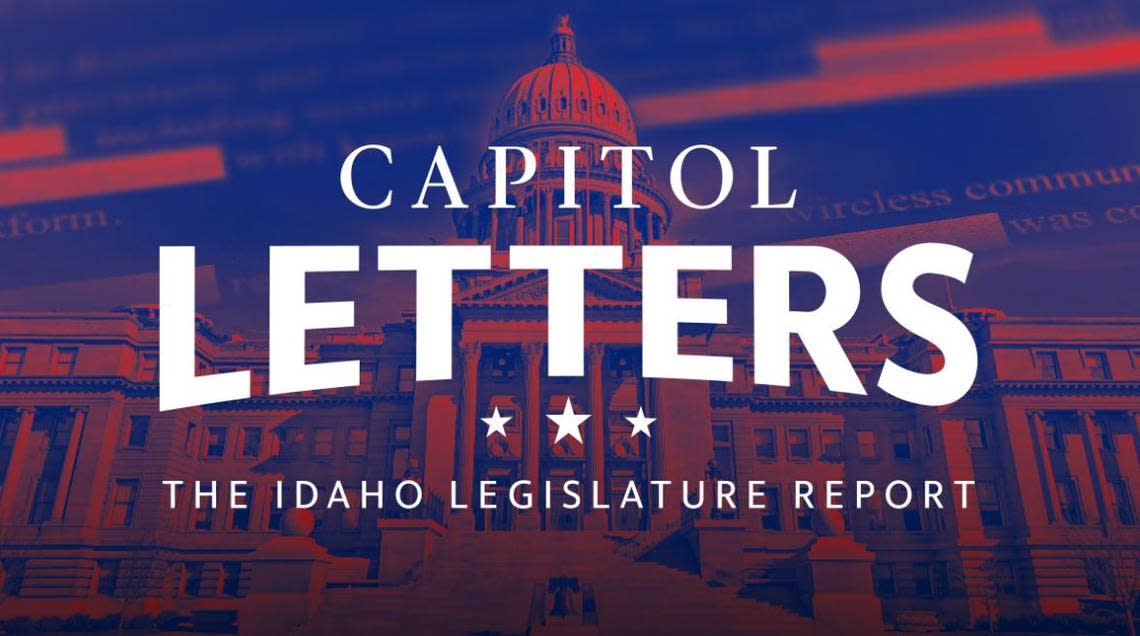Capitol Letters: Many Republicans aren’t buying Gov. Little’s workforce grant program

By Ryan Suppe, State Politics Reporter
Competing education spending priorities were on display yesterday: Idaho Gov. Brad Little’s proposal to offer scholarships to public college and workforce training students against Middleton Sen. Tammy Nichols’ new bill to direct state funding to private school students.
Little’s proposal provides up to $8,500 scholarships to Idaho high school graduates enrolling in state and community colleges as well as workforce training programs.
The $102 million fund — which includes $80 million set aside for workforce development during last year’s special legislative session — would prioritize in-demand careers, as employers say they’re struggling to find qualified workers.
“It’s a job-driven program rather than a degree-driven program,” said House Majority Leader Megan Blanksma, R-Hammett, who’s sponsoring the bill. “If we’re going to use taxpayer dollars, the target should be driving the economy.”
The House Education Committee cleared the legislation by just two votes. Some Republicans in the House committee said they would prefer the money be directed to high school training programs, while others questioned whether the grants fall within the state’s purview.
Industry and education leaders back the proposal. A recruiting executive at WinCo Foods and representatives from the Idaho State Dental Association and the Idaho Association of Commerce and Industry testified in favor of the bill.
“This piece of legislation will get more skilled workers through their doors,” said Cally Roach, a retired business executive who now sits on the Idaho State Board of Education.
Read my full story here.
Middleton senator pushes private education subsidies
Nichols’ bill would allow private school students to draw state funding for tuition, uniforms, tutoring and other education expenses.
Republicans in Iowa and Utah last month passed similar legislation creating “education savings accounts” amid a nationwide push to subsidize private education.
Nichols said her bill is modeled after an Arizona program, which lawmakers last year expanded to include all students eligible for public school, regardless of their family income. Nichols bill also does not have income limits.
“States are realizing that current educational needs and environments are not fully being met,” Nichols, a Republican, told the Senate Education Committee yesterday. “Through an (education savings account) parents will be the ones we empower rather than the unions and education bureaucracies.”
The scholarships would be worth about $6,000 annually, according to a recent news release from the Idaho Freedom Caucus, which Nichols co-chairs. That would amount to a $19.4 million cost to the state in the program’s first year, the news release said.
What to expect today
8 a.m. Joint Finance-Appropriations. Officials from the Idaho Parks and Recreation and Agriculture departments will present on their budget proposals for the next fiscal year.
8 a.m. Senate State Affairs. Lawmakers will consider a bill from Sen. Scott Herndon, R-Sagle, that would block state agencies from requiring contractors to allow transgender people access to restrooms that align with their gender identity. The committee will also consider a joint resolution from Sen. Doug Okuniewicz, R-Hayden, making it more difficult for ballot initiatives to qualify for elections.
9 a.m. House Education. Idaho Superintendent for Public Instruction Debbie Critchfield will present her vision and budget goals for career technical education.
9 a.m. House State Affairs. Lawmakers will consider legislation on immunizations and a “memorial authorizing Idaho and Oregon legislatures to begin official discussions.”
Opinion: School voucher downsides
By Scott McIntosh, Opinion editor
The Idaho Senate Education Committee on Tuesday agreed to print a bill that would bring school vouchers to Idaho.
Idaho Sen. Tammy Nichols, R-Middleton, introduced the bill, the “Freedom In Education Savings Accounts,” which would allow Idaho families to collect taxpayer dollars to use for private school tuition. It’s cut-and-paste legislation from the American Legislative Exchange Council.
If approved, Idaho wouldn’t be the first state to have vouchers. Other states, such as Wisconsin, Indiana and Arizona, have had vouchers for several years. Utah legislators are considering a school voucher system.
“This legislation has been modeled after Arizona, with 10 years of experience and is considered the gold standard being used by most other states,” Nichols said in introducing her bill.
So let’s take a look at Arizona’s experience to see what’s in store for Idaho if this bill becomes law.
If you like this newsletter, forward to a friend or colleague, and they can sign up here.
